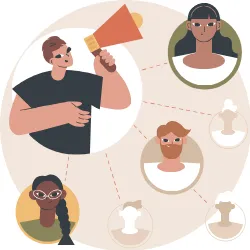· tutorials · 12 min read
Ultimate Guide to Authentic Testimonials: 12 Questions (2024)
In this article, you will learn 12 questions to ask your clients and customers to get testimonials that showcase the value of your product or service. You will also learn how to choose the right customer, timing, and format for your testimonial requests for testimonials that are that are authentic, relevant, and effective.
.xqEl_QxJ.png)
Art of Asking Testimonials: 12 Questions for Authentic Reviews
Table of contents
The Power of Persuasion: Why Testimonials Are Your Secret Weapon for Conversions
In today’s digital age, consumers are bombarded with marketing messages. It’s a struggle to cut through the noise and convince someone to trust your brand, let alone open their wallets.
That’s where the magic of social proof comes in.
Think about it: have you ever hesitated over a purchase, then scrolled down to see what other customers are saying? Testimonials are those shining endorsements that act as a virtual thumbs-up from satisfied customers. They build trust, alleviate concerns, and ultimately push hesitant visitors towards that coveted “buy” button.
This post dives deep into the world of testimonial gold. We’ll equip you with the perfect questions to extract powerful, conversion-boosting quotes from your happy tribe.
Whether you’re slinging awesome software, stunning photography, or top-notch freelance services, you’ll find actionable tips and examples to craft testimonial requests that get results.
The Problems Testimonials Solve: Building Trust and Boosting Conversions
Testimonials are powerful because they address key concerns that hold potential customers back:
Deeper connection with your potential customers

Testimonials bridge the gap between your brand and your target customers. They allow potential customers to see themselves reflected in the stories of real people who have benefitted from your product or service. This builds a sense of connection and fosters a more trusting relationship and inspire your prospects to stay longer on your website.
Elevated brand reputation
Positive testimonials act as a glowing endorsement, instantly elevating your brand reputation. They showcase your expertise and build trust in your ability to deliver exceptional results.
Proactive word-of-mouth marketing

Testimonials are a form of proactive word-of-mouth marketing. When happy and satisfied customers share their positive experiences, they’re essentially vouching for your brand, attracting new customers organically and increasing your reach.
Beyond Trust: The Additional Benefits of Testimonials
The power of testimonials goes beyond building trust. They offer a range of additional benefits:
Your brand can enjoy more spotlight
Testimonials put the spotlight on your brand’s strengths. They highlight the specific features and benefits that resonate most with your future clients and customers.
Improved engagement
Testimonials can spark conversation and increase engagement with your brand. They provide a springboard for social media discussions and encourage potential customers to ask questions or share their own experiences.

Boosted SEO
Testimonials can actually improve your website’s search engine ranking (SEO). Since testimonials often include relevant keywords, they can help your website appear in search results more frequently.
In short, testimonials are a versatile tool that can be leveraged to build trust, enhance brand reputation, boost conversions, and improve your overall marketing strategy. The next step? Learning how to ask the right questions to unlock the power of testimonials within your happy customer base!
Step 1: What’s the goal driving your testimonial collection?
Are your out to conquer new territories? Are you trying to capture customer language and fuel marketing campaigns? Address objections during demos?. Are you showcasing features, swatting objections, or outshining competitors?
Choosing your goal correctly will help you tailor your questions to get the most relevant and effective testimonials.
- Address Objections with Heart: Alleviate concerns by sharing stories of happy satisfied customers and their positive experiences.
- Speak Their Language: Grasp your customers’ vernacular. Align with their messaging. Address their needs empathetically.
- Rise Above Competitors, Leave a Mark: Use testimonials as your unique voice to surpass competitors, fostering deep connections with potential clients.
- Build Loyalty, Deepen Connections: Seal cracks. Testimonials foster loyalty, enhance retention. Engage for trust, loyalty, and growth.
- Fuel Your Campaigns: Are you gearing up for a marketing blitz? Testimonials can be jet fuel for your campaigns.
- Revamp Social Media with Video Testimonials: Create emotional connections on social media through compelling video testimonials.
- Capture new Segments/Geography/Industry: Harness testimonials collected from similar ICPs for your new prospective customers in the target industry/geography/customer segments to empathize with and connect.
Step 2: Who will be the most receptive customers to help you reach your goals?
Begin your audience exploration with research. Surveys gather vital info on demographics, psychographics, including age, gender, occupation, income, location, values, beliefs, and lifestyle of your existing customers.
Depending on your objective, consider these questions to filter your happy customers effectively for the questionnaire
- Most satisfied customers overall
- Users effectively utilizing specific features
- Customers from specific industries
- Long-term product users
- Geographical location-based customers
- Social media-active customers
- Customers who have referred others
Should it be a video testimonial? It depends, Consider your prospective clients: For B2C or social media, video testimonials shine; B2B prefers written. Case studies benefit from video, too.
Step 3: What’s the Best Timing for ask for a Testimonials from Users?
Timing matters. Solicit testimonials when customers are most satisfied, achieving aha moment, renewing contracts, or providing positive feedback.
Initiate requests within days of trigger events to capture fresh experiences. Early usage, within months, yields more compelling testimonials than later stages.
-
Post-Purchase Onboarding: Engage customers after their purchase journey to ensure they feel supported. Use follow-up emails or pop-up chats to capture their feedback when they’re most satisfied. Make their voice heard and valued.
-
NPS Survey Feedback: After customers provide positive feedback through NPS surveys, seize the opportunity to request testimonials. Their positive sentiments can translate into compelling testimonials that boost your brand’s credibility.
-
Social Media Monitoring: Stay attentive to social media channels where customers may express satisfaction. Reach out to them personally, acknowledging their positive comments, and kindly request their participation in providing testimonials.
-
In-Person Testimonials: Events, conferences, or trade shows provide excellent opportunities to capture testimonials. Create inviting spaces where customers feel comfortable sharing their experiences, whether through video or written feedback.
-
Referral Program Engagement: Encourage satisfied customers to become brand advocates through referral programs. When they refer others, kindly ask if they would also be willing to share their positive experiences as testimonials.
-
Customer Support Initiatives: When customers receive exceptional support, it’s a prime moment to request testimonials. Show appreciation for their feedback and their trust in your team’s ability to address their needs.
-
Customer Success Achievements: Celebrate customer milestones and successes by asking for testimonials. Highlighting their achievements not only benefits your brand but also reinforces their sense of accomplishment.
-
Customer Advocacy Involvement: Empower your brand advocates to share their experiences through testimonials. Recognize their contributions and foster a sense of community where their voices are heard and valued.
Step 4: Refine: What are the best strategies for a business to get testimonials for its products or services?
Now you have a plan with a goal, right customers and timing. Next lets ensure we lay some ground rules for eliciting positive testimonials.
- Consider respondent attention spans. Limit questions to 8-15 for better engagement and meaningful insights.
- Avoid obvious questions like company size, company name etc. Try leveraging tools like ZoomInfo or Clearbit for obvious customer details and approaching the customer only for their personalized experience, respecting their time.
- Guide them based on previous information. Offer selectable hints or pre-filled text options for user customization, streamlining the process.
- Focus on specific examples: Encourage detailed descriptions of how your product directly addressed their challenges and provided value.
- Positive framing: Ask questions that naturally lead to positive responses about the solution and its impact.
- Optimize format and length for mobile. Provide varied input types: select options, rating scales, and text fields.
- Obtain permission for using testimonials. Include a checkbox for consent in the form.
- Incentivize testimonials. Offer discounts, freebies, charity donations. Thank customers and explain testimonial usage.
- Simplify testimonial submission. Offer various feedback options: link, form, survey, or video recording.
- Personalize emails for better response. Address recipients by name. If possible, refer to their specific experiences and previous positive interactions with the product.
- Consider video testimonials for B2C or social media. B2B products often favor written testimonials, easier to obtain.
- Stay focused on your objective. Guide testimonials to highlight benefits, solutions, or notable features for clarity and relevance.
Step 5: Choose the best testimonial questions for your goal and customer/client
By choosing these questions strategically from each group, you can gather valuable insights into your client’s experience, showcase your strengths, and identify areas for improvement to further enhance your services. Where possible, try to choose or tailor the questions specific to the customer’s unique experience with your product or service.
For example, if a client was very appreciative of your prompt updates and communication, you could ask them to elaborate on that experience.
Great Testimonial Questions for your B2B/SaaS app or product Endorsements

Understanding the Problem:
- What specific challenges did you face beforehand?
- How did [our product/app] address your initial problem?
- What prevented you from joining earlier? (can also reveal pre-existing challenges)
Product/Service Value:
- Can you highlight standout features you find valuable?
- In what ways did [our product/app] exceed your expectations?
- How did [our product/app] impact your productivity?
- How has [our product/app] improved your operations?
- Any notable achievements from using [our product/app]?
- How has [our product/app] aided your company’s growth?
Decision Making & Comparison:
- What convinced you to switch to [our product/app] from [competitor]?
- Prior to using [our product/app], what limitations or frustrations did you experience with the solutions you were previously using?” (Indirectly reveals competitor weaknesses)
- Can you elaborate on the factors that ultimately convinced you that [your product/app] was the superior choice for your business requirements?
Customer Experience:
- Would you recommend [our product/app] to others? Why?
- Any obstacles while using [our product/app]? How were they resolved?
- How satisfied are you with our team’s support?
Improvement & Feedback:
- Suggestions for additional features or improvements?
- Any other experiences with [our product/app] to share? What surprised you the most? (Elicits positive surprise and exceeded expectations)
Additional Questions:
- You can add a question about the overall value proposition: “How would you describe the overall value you’ve received from using [our product/app]?”
- Consider a question about future usage: “How do you see [our product/app] playing a role in your future success?”
Testimonial Questions for Clients of Freelance and Consulting Services
Freelance and Consulting services are unique, and the questions should reflect the specific challenges and outcomes of the project. Here are some questions tailored to the freelance and consulting industry.
Project Experience:
- What challenges did you face before hiring me? (Initial needs and pain points)
- What were your concerns before hiring me for this project?
- Can you briefly describe our completed project?
- Did the project timeline meet your expectations? (Delivery and efficiency)
- Were deliverables timely and as expected? (Meeting deadlines and quality standards)
Client Satisfaction:
- Would you choose to work with me again? What aspects guide your decision?
- Would you recommend my services, and why?
Freelancer Performance:
- What results did you experience from my work? (Measurable outcomes and impact)
- Any impressive aspects of my work? (Highlighting specific strengths)
- How was your experience with my communication and responsiveness? (Professionalism and communication style)
- Any positive changes from my contributions? (Value addition and problem-solving)
Feedback and Improvement:
- Suggestions for improvement in my services? (Areas for development and growth)
- Can I use your feedback as a testimonial? Any preferences for attribution? (Permission to use testimonial and preferred way to credit the client)
Questions to ask Commercial/Wedding/Baby Photography Clients for Testimonials
Here we have taken questions from the above sections and tailored them to suit the photography industry. You can see that the questions are more focused on the photography experience and the impact of the photographer’s work on the client’s project or event.

Project and Photographer Performance:
- Can you briefly describe the project or photo shoot we completed together?
- Did you feel that I understood and fulfilled your vision for the project? If so, how? (Understanding client needs and vision)
- How was your experience working with me in terms of communication, punctuality, flexibility, or delivery? (Professionalism and work ethic)
- Did you appreciate the creativity and innovation in my photography? If so, can you provide examples?
- What did you like most about my photography style, technique, equipment, or approach? (Strengths and unique aspects)
Client Satisfaction and Impact:
- How satisfied were you with the overall quality of the photographs?
- How did the photographs contribute to achieving your goals or objectives for the project?
- Did you feel that you received good value for your investment in my services?
- Would you be likely to work with me again or recommend me to others? If so, why?
- What results or benefits did you get from using my photography, such as increased sales, brand awareness, customer satisfaction, or recognition?
- How did I make you feel during the project, such as friendly, enthusiastic, professional, or passionate?
Additional Information:
- Is there anything else you would like to add or share about my service or your project? (Open-ended feedback and potential areas for improvement)
- May I have your permission to use your feedback as a testimonial on my website/portfolio? If so, is there any specific attribution you prefer? (Permission and preferred crediting)
Almost There: What Awaits Beyond the Finish Line?
Prepare your questions: Conduct internal mock interviews to ensure alignment with goals. Refine questions as needed. Once satisfied, use them for customer testimonials.
After the initial email, follow up politely on pending testimonials after a week if there’s no response.
If a client provides a testimonial, express gratitude for their time and thank them upon receiving a response with a personalized note.
And once the testimonial is up on the website or social media, do remember to share with the customers of the testimonial’s usage. Beyond the engagement score, you will delight the customer and earn their loyalty forever.